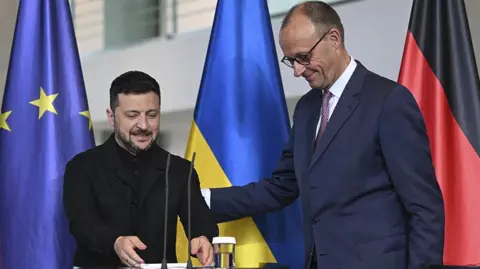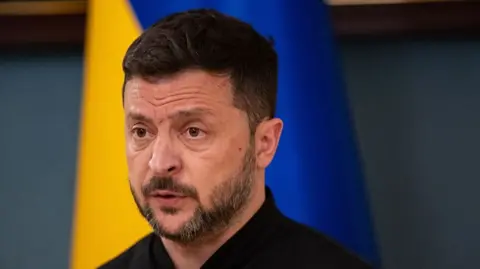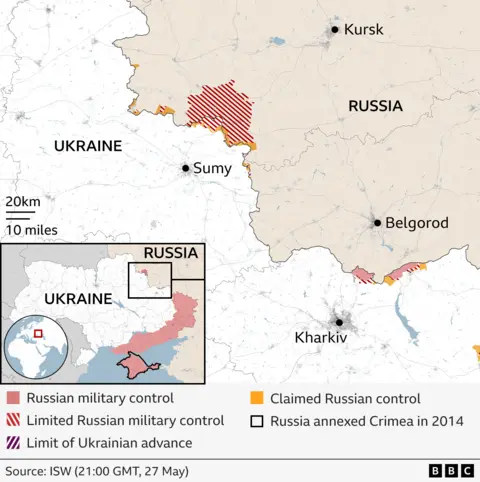German chancellor promises to help Ukraine produce long-range weapons
 Anadolu via Getty Images
Anadolu via Getty ImagesGermany's new chancellor, Friedrich Merz, has told Ukraine's Volodymyr Zelensky that Berlin will help Kyiv produce long-range weapons to defend itself from Russian attack.
"We want to talk about production and we will not publicly discuss details," he said, when asked by reporters in Berlin if Germany would supply Kyiv with its Taurus missiles.
Merz took office earlier this month, promising to beef up German support for Ukraine, and said this week that there were "no longer" any range restrictions on weapons supplied by Kyiv's Western allies.
For weeks there has been speculation that Merz will allow the deployment of German-made Taurus missiles, which have a range of 500km (310 miles) and could reach deeper into Russian territory than other far-range weapons.
Merz did not refer to the Taurus during his press conference with the Ukrainian leader, and German newspaper Spiegel said later that the systems being developed by Ukraine were not as sophisticated as Taurus but had the advantage of being easier to operate.
Germany's defence ministry said in a statement that Berlin would finance the production of long-range weapons systems in Ukraine and that the "first of these systems could be deployed in the Ukrainian armed forces in just a few weeks".
The Kremlin has warned that any decision to end range restrictions on the missiles that Ukraine can use would be a quite dangerous change in policy that would harm efforts to reach a political deal.
However, Merz has since emphasised that a decision on lifting range restrictions was taken by Western allies months ago.
The new chancellor is seeking to cut a far more assertive figure on support for Ukraine than his predecessor, Olaf Scholz.
So far, he is succeeding.
There may be many questions about the detail of Merz's missile co-operation plan but his willingness to make big announcements that might antagonise the Kremlin stands in stark contrast to the cautious tone of the last government.
During his press conference with Zelensky, Merz promised Ukraine continued support for as long as necessary, warning Moscow that its refusal to take part in further peace talks would have "real consequences".
Zelensky has called for talks aimed at reaching a settlement on the war to involve three leaders - "Trump-Putin-me" - although he added he was ready for any format.
Kremlin spokesman Dmitry Peskov did not dismiss the idea out of hand but said such a meeting could only take place after "concrete agreements" had been reached between "the two delegations."
 Getty Images
Getty ImagesAlthough Ukraine and Russia held their first direct talks for more than three years in Istanbul earlier this month, the meeting involved low-level officials and they were only able to agree on a prisoner exchange, which took place last weekend.
On Wednesday, however, Russian Foreign Minister Sergei Lavrov said that Moscow is indeed ready to hold a second round of peace talks with Kyiv.
According to a statement posted on state news agency Tass, he said the next round of talks could take place on 2 June in Istanbul where Russia would present a "memorandum" outlining its peace terms.
"We hope that all those who are sincerely, and not just in words, interested in the success of the peace process will support holding a new round of direct Russian-Ukrainian negotiations," Lavrov said.
Lavrov added he had briefed US counterpart Marco Rubio on the proposal.
Lavrov had also previously made clear that Moscow was looking to guarantee Ukraine's "neutral, non-aligned and non-nuclear status".
Ukraine said they were not opposed to further meetings but "the next meeting must yield results".
In a post on X, Ukraine's defence minister Rustem Umerov said the country had already submitted its peace terms to Russia and demanded Moscow do the same.
US President Donald Trump indicated this week that his patience was wearing thin with Russia's failure to move forward with further talks.
He accused Vladimir Putin of "playing with fire", after a deadly Russian missile strike that killed 13 Ukrainians, including children. However, Russian officials suggested that Trump was not sufficiently informed on the context of the conflict.
Ukraine's president has urged Washington to impose sanctions on Russia's banking and energy sectors. He said he had discussed the issue with Trump, adding that the US president had "confirmed that if Russia does not stop, sanctions will be imposed".

Despite the continued diplomatic manoeuvres, Ukraine's military reported one of its largest drone barrages on Russian targets to date overnight in to Wednesday, while Zelensky said Russia had launched more than 900 drones over a three-day period ending early on Monday morning.
On the ground, Ukraine's defences have come under increased Russian attack in the northeast.
Zelensky said Moscow was "amassing" over 50,000 troops along the Sumy front, where Russian forces have seized several villages across the Ukrainian border in an effort to create what Putin calls "security buffer zones".
Sumy governor Oleh Hryhorov said Russian forces had seized four villages and that fighting was continuing near other settlements in the area.
The war, now into its fourth year, has claimed tens of thousands of lives and left much of Ukraine's east and south in ruins. Moscow controls roughly one-fifth of the country's territory, including Crimea, which it annexed in 2014.
Zelensky has accused Moscow of delaying the peace process and said they are yet to deliver a promised memorandum of peace terms following talks in Istanbul. Peskov insisted the document was in its "final stages."
